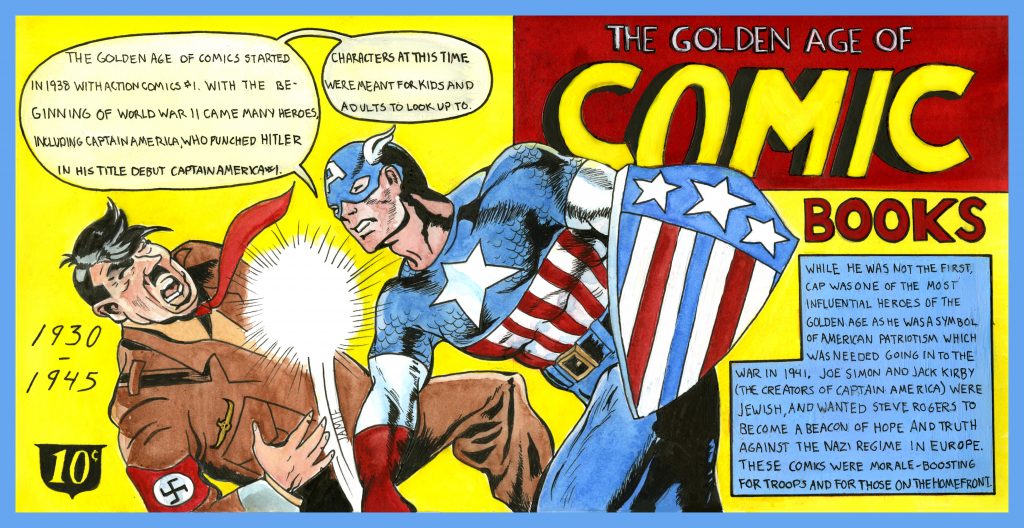
The Golden Age of Comics is widely agreed to have started in 1938, with the arrival of Superman on the comic book scene with his first appearance in Action Comics #1. Characters at this time were very one-dimensional and visible; beacons of perfection that children and adults alike could look up to and trust in their protection. Storylines were short, arcs rarely branching beyond a single issue, and featured little to no character development or moral dilemma.
Superman was an immediate hit, and paved the way for many of the heroes we still see today. This can be seen in the emergence of Batman a year later in May of 1939, in Detective Comics #27. The Human Torch first appeared in Marvel Comics #1, followed shortly by The Flash in 1940, appearing in Flash Comics #1. Captain Marvel smashed onto the comic scene in 1940, bringing with him Mary Marvel and Captain Marvel Jr, who were the first superhero family and led to the trend of super-families and interconnected hero storylines.
Comics were influential to kids and adults alike, and these heroes became significant in many popular culture. They were a symbol of hope in dark times, emerging in the late 30’s during the Great Depression and one of the darkest times in economic American history. People were looking for something to believe in, and many people found it in comic books.
With the beginning of World War II came many other heroes, namely Captain America, who punched Hitler in his debut in Captain America Comics #1 in March of 1941. While he was not the first, Captain America was one of the most influential superheroes of the Golden Age, as he was a symbol of American patriotism which is what they needed going into the war in 1941. Both Joe Simon and Jack Kirby (the creators of Captain America) were Jewish, and wanted Steve Rogers to become a beacon of hope and truth against the Nazi regime in Europe.
These comics were a way for average people back at home to feel as though they were participating in the war effort, and kept morale up for troops.
For this spread I got to choose whatever I wanted as a subject, and so I decided to choose the Golden Age of Comics. Comics have had a large cultural impact, as well as an impact on my life personally, and I love them very much. I wanted to discuss the overlap between comics and World War II, as well as my favourite hero of all time, and this gave me the perfect opportunity to do so.
When designing this spread, I really wanted to hearken back to the style of the comics of the late 30’s/early 40’s. The prominent image depicts Captain America socking Hitler in the face, as he did on the cover page of his first title issue. The blue text box off to the right was placed there as a sort of narration, which can be found in early comics. The most natural place for the rest of the text was in speech bubbles. I wanted to keep the white space in the punch bubble, so I left that empty and instead put the year range off to the side to balance out some of the empty space there. The 10 cent bubble was on nearly every cover issue I looked at as reference, and so I wanted to include it. The heading is in the style of titles found on cover pages in the 1940’s. The colours I used were commonly found in Golden Age comic books, as they had limited printer colours and wanted to make the most of what they were able to print. I used watercolours to give it a bold, but still slightly washed out and faded look to emulate the style of comics at the time, as they were printed on cheaper paper than the glossy style ones we have nowadays.
I’m very proud of this spread, and I’d give myself a 9.5/10. Some of the lines could be cleaner, but that’s a result of executing it traditionally. The spaces between the text could also be closer to provide room for more words, and the title font is not consistent, as well as a bit wonky, but other than that I wouldn’t change anything.
References:
https://en.wikipedia.org/wiki/Superman
https://www.imdb.com/title/tt5730352/
https://en.wikipedia.org/wiki/Golden_Age_of_Comic_Books